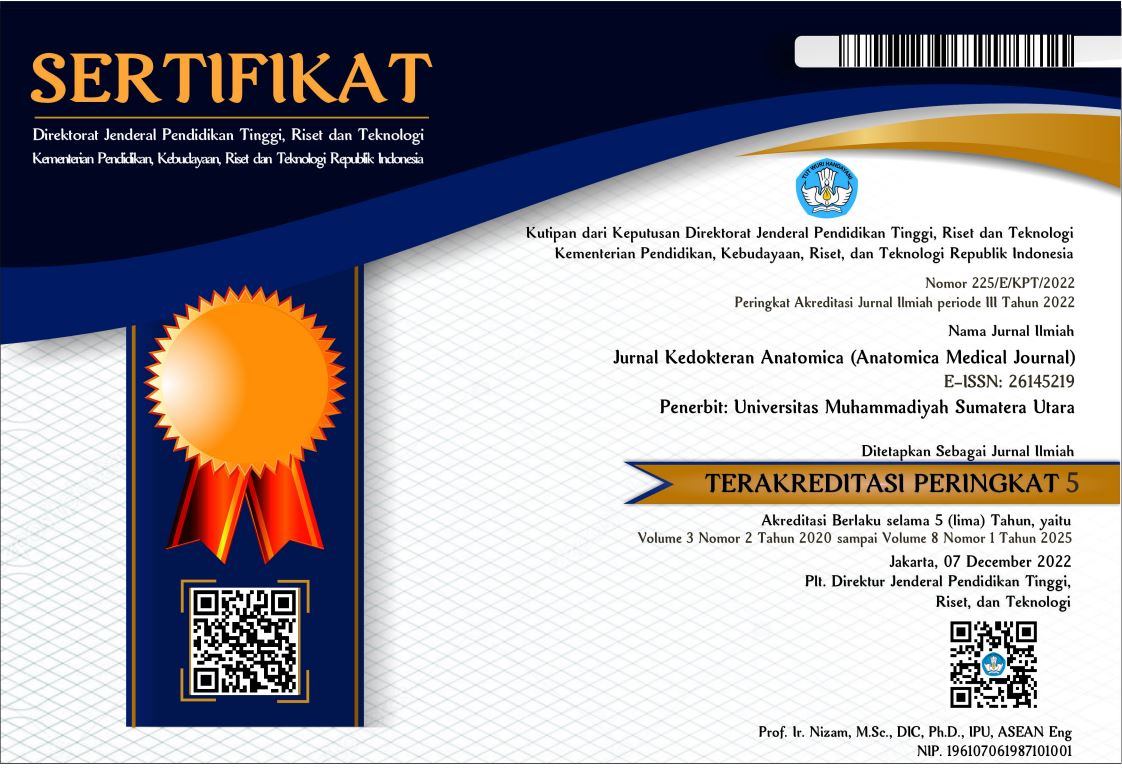Heat Shock Protein pada Kanker
Abstract
ABSTRAK
Suatu keadaan stres dapat terjadi dengan adanya impuls dari lingkungan eksternal dan internal. Setiap keadaan stres memiliki efek terhadap aktivasi sistem neuroendokrin, khususnya hipothalamus-pituitari-kelenjar adrenal-susunan saraf simpatis. Setiap sel akan berespon terhadap keadaan stres, menginduksi atau meningkatkan sintesis dari protein stres yang dikenal dengan Heat Shock Protein (HSP)1,2. HSP terekspresikan secara berlebih pada sejumlah besar kanker pada manusia dan terlibat dalam proliferasi, differensiasi, invasi, metastasis, dan pengenalan sel oleh sistem imun.3 HSP tidak cukup informatif pada tingkat diagnostik, HSP berguna sebagai biomarker karsinogenesis pada sejumlah jaringan dan derajat differensiasi dan agresifitas pada sejumlah kanker. HSP juga berfungsi sebagai prognostik dan dapat memprediksi respon terhadap terapi anti kanker.. 3,4
Full Text:
PDFReferences
Bonorino C, Souza AP. Hsp70 in Tumors: Friend or Foe? Heat shock proteins in cancer, 2007.191207.
Kapoor C, Vaidya S. Heat Shock Protein (HSP) And Cancer: An Overview. American Journal Of Medical And Dental Sciences, 2013.
Berek JS, Hacker FN . Biology and Genetic. Berek and Hacker's Gynecologic Oncology, Lippincott Williams & Wilkins. 5th Edition. Chapter 1.2010: 2-5
Ciocca DR, Calderwood SK. Heat Shock Proteins In Cancer: Diagnostic, Prognostic, Predictive,And Treatment Implications. Cell Stress & Chaperones (2005) 10 (2), 86103
Welch WJ. Reference guide: Heat Shock Protein and the Cellular Stress Response.Available from URL : www.assaydesign.com
Trivedi V, et al. Role of Heat Shock Proteins in Immune Response and Immunotherapy for Human Cancer. International Journal of Pharmaceutical Sciences Review and Research. Volume 2, Issue 2, May June 2010.
Jolly C, Morimoto RI. Role of the Heat Shock Response and Molecular Chaperones in Oncogenesis and Cell Death. Journal of National Cancer Institute.Vol 92.No 19. 2000: 1564-72
Ciocca DR, Arrigo AP, Calderwood SK. Heat Shock Proteins and Heat Shock Factor 1 in Carcinogenesis and Tumor Development: an Update. Arch Toxicol. Jan 2013; 87(1): 1948.
Creagh EM, Sheehan D, Cotter TG. Heat Shock Proteins Modulators Of Apoptosis In Tumour Cells. Leukemia (2000) 14, 11611173
Voelmy R, Boellman F. Chaperone Regulation of the Heat Shock Protein Response. Moleculer Aspects of the Stress Response: Chaperones, Membranes, and Networks. Chapter 9. 2007: p.89-90
Lanneau et al. Heat Shock Proteins: Essential Proteins For Apoptosis Regulation. J. Cell. Mol. Med. Vol 12, No 3, 2008.
Sreedhar AS, Csermely P. Heat shock proteins in the regulation of apoptosis:
New strategies in tumor therapy. A comprehensive review. Pharmacology & Therapeutics 101 (2004) 227 257.
Rastogi RP, Sinha R. Apoptosis: Molecular Mechanisms And Pathogenicity. EXCLI Journal 2009;8:155-181.
Mayer MP, Bukau B. Hsp70 chaperones: Cellular functions and molecular mechanism. CMLS, Cell. Mol. Life Sci. 62 (2005) 670684
Schmitt E, et al. Intracellular And Extracellular Functions Of Heat Shock Proteins: Repercussions In Cancer Therapy. Journal Of Leukocyte Biology Volume 81, 2007.
Park CS, et al. An Immunohistochemical Analysis of Heat Shock Protein 70, p53, and Estrogen Receptor Status in Carcinoma of the Uterine Cervix. Gynecologic Oncology 74, 5360 (1999).
Juhasz K, et al. The Complex Function of Hsp70 in Metastatic Cancer. Cancers. 2014, 6, 42-66;
Calderwood SK, Stevenson MA, Murshid A. Heat Shock Proteins, Autoimmunity, and Cancer Treatment. Hindawi Publishing Corporation. Autoimmune Diseases. Volume 2012.
Wells AD, Malkovsky M. Heat Shock Proteins, Tumor Immunogenicity And Antigen Presentation: An Integrated View. Immunology Today.Vol.21 No.3.2000.p.129-32
DOI: https://doi.org/10.30596/anatomica
DOI (PDF): https://doi.org/10.30596/amj.v2i2.2995.g2823
Refbacks
- There are currently no refbacks.
Jurnal Kedokteran Anatomica/ Anatomica Medical Journal (AMJ)
E-mail: amj_fk@umsu.ac.id || Editorial Contact: 081375150018
This work is licensed under aCreative Commons Attribution-ShareAlike 4.0 International License.


.png)
